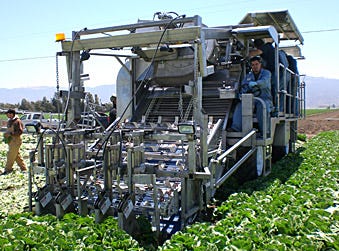Immigration has been a major topic in the news and in our political discourse. Various factions in the discussion assert that immigrants either:
Perform jobs that Americans are unwilling to do; or,
Take jobs away from American workers.
The fact is, both are probably true to some extent.
But I’d like to amend the first point. Americans are most likely unwilling to perform some jobs at the wage rate that employers are willing to pay.
For example, according to the University of California at Davis, if a farmer is willing to pay the $15 minimum wage, workers performing the backbreaking work of harvesting romaine lettuce might make the minimum and a couple of dollars more with harvesting bonuses. In fact, the average hourly rate for a picker is $16.37.
Harvesting lettuce doesn’t require the worker be conversant in English, which many immigrants are not. Minimum wage jobs in the retail or food service industries generally requires some fluency in English, not to mention that stocking shelves and waitressing can be a lot less physically taxing than harvesting lettuce.
But would some native workers pick lettuce if the wage was $25/hour? $30/hour? Probably.
So, immigrants who may not be able to work in other minimum wage jobs will seek employment where they have the skills to do well. So do native workers.
But what happens when the immigrant is in our country illegally? Well, then the employer is taking a chance in knowingly hiring that worker as they are technically breaking the law.
Illegal immigrants have an incentive to work at sub-minimum wage jobs, as (without resorting to crime) they need to earn to survive. Employers may be willing to take the chance hiring illegals if they can pay sub-minimum wages.
Regardless of their legal status, over time many immigrants will learn English and acquire additional marketable skills, thereby gaining employment in less physical, more highly compensated jobs.
What happens to, for example, farmers who have relied on inexpensive manual labor to plant, weed and harvest their crops when the supply of workers evaporates? Or when labor and fuel costs make farming uneconomical? What happens when a state, like California, raises its minimum wage to a level that is unaffordable for many companies?
Many industries turn to automation.
Fast food restaurants can use the Flippy Fry Station which can deep fry various foods.
Nowadays automation is more than just a machine doing a single repetitive task. With the advent of Artificial Intelligence (AI), more complex jobs can be performed without human intervention.
According to Duke University, 61% of large companies plan to use AI to automate tasks once done exclusively by employees. According to the consulting firm McKinsey, the use of AI in businesses has grown rapidly over the past few years. McKinsey’s “The state of AI in early 2024” report stated that AI adoption jumped from 20% in 2017 to 72% in 2024, showing how quickly companies are turning to this technology to improve their operations.
* * *
Going back to the initial example of a lettuce farmer using immigrants to farm lettuce, here are some examples of automation that can make a huge difference in the viability of farms large and small by reducing the number of laborers or eliminating them entirely.
Machines can plant the lettuce:
Machines can thin and weed lettuce fields at ⅓ of the cost of hand labor
Here’s a totally new technology that not only eliminates the labor-intensive process of weeding, but does so without pesticides or chemicals, a farming robot that can kill 200,000 weeds per hour with lasers.
Incredible!
Machines with water jets can harvest heads of romaine lettuce:
If you’re willing to watch a 13-minute video, here are some amazing farming technologies you may not know about:
* * *
Many believe that immigrants are a benefit to the labor market. The fact is, according to the Bureau of Labor Statistics, the August 2024 jobs report showed that native-born Americans lost more than 1.3 million jobs over the last year, while foreign-born workers have gained over 1.2 million jobs.
* * *
So, as with many aspects in life, moderation is the key to success. We need to arrive at a system that makes it easier for people with skills that benefit the country to immigrate to the U.S. legally, while discouraging illegal immigration.
And, with the advent of AI, many jobs across the economy may soon evaporate. We need to consider these job losses when inviting others into our country.
Your thoughts?







The genie is out of the bottle. Short of something catastrophic (EMP?), technology and AI are here to stay. As you’ve pointed out, many repetitive, low skill, manual tasks will be done by robots/AI. Take a look at Boston Dynamic and Optimus for great examples. The argument that we need immigrants to provide cheap labor will soon be moot. And the US cannot sustainably be a trough for the world. The only solution is careful vetting of who is permitted to enter our country.